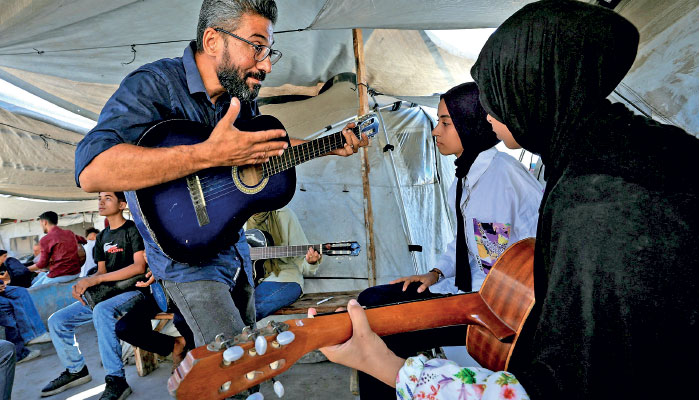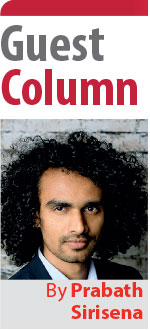Monday Feb 16, 2026
Monday Feb 16, 2026
Monday, 8 September 2025 01:27 - - {{hitsCtrl.values.hits}}

Ahmed Abu Amsha and the children’s music group Gaza Birds Singing – Reuters
 I wonder: what inhuman power compels one to walk, or crawl, or locomote in any way whatsoever, towards gunfire so that another life may not end while they live? Surely, this must be the animalistic behaviour Barrack is referring to, through which the bravery of “the region” still shines forth
I wonder: what inhuman power compels one to walk, or crawl, or locomote in any way whatsoever, towards gunfire so that another life may not end while they live? Surely, this must be the animalistic behaviour Barrack is referring to, through which the bravery of “the region” still shines forth
 “Do you think this is fun for us,” asked Tom Barrack, the US special envoy for Syria, addressing a group of Lebanese journalists after a meeting with President Joseph Aoun in Beirut on 26 August. Speaking what appears to be the only language he knows—that of finance—and referring to his deputy Morgan Ortagus, he further added, “Do you think this is economically beneficial for Morgan and I to be here putting up with this insanity?”
“Do you think this is fun for us,” asked Tom Barrack, the US special envoy for Syria, addressing a group of Lebanese journalists after a meeting with President Joseph Aoun in Beirut on 26 August. Speaking what appears to be the only language he knows—that of finance—and referring to his deputy Morgan Ortagus, he further added, “Do you think this is economically beneficial for Morgan and I to be here putting up with this insanity?”
What had caused such grief to the benevolent envoy was the way the journalists had started peppering him with questions when he entered the room. Having graced Lebanon with his presence, even though it made no financial sense apparently, Barrack had to admonish his audience before answering any questions: “The moment this starts becoming chaotic, like animalistic, we’re gone. So you want to know what’s happening, act civilised, act kind, act tolerant, because this is the problem with what’s happening in the region.”
When he’s not busy advising people of “the region” how to be civilised, Barrack attends to his duties as the billionaire founder and executive chairman of Colony Capital (which has been renamed as DigitalBridge). What the renaming of his company had tried to conceal, Barrack managed to blurt out in the open that day. I found the whole spectacle rather refreshing. Here was an almost comically archetypal coloniser, standing in public, in front of a mic, speaking his mind, without restraint or pretence, revealing to the world what he truly thinks.
And since it cannot be that the billionaire envoy from the US is mistaken, I had to adjust some of my own ways of seeing things. Through this new interpretive lens (which, I admit, might not exactly be what Barrack had intended), I could see some incidents in Gaza in the past few days where the chaotic, animalistic, uncivilised, unkind, and intolerant ways of the natives were on display.
Chaotic grace
Nooh Al-Shaghnoubi is putting on the bright orange t-shirt of the civil defence forces of Gaza. It looks old, but the colour unmistakably stands out against the uniformly grey backdrop of the dystopian rubble. There has been a drone strike, Nooh says, and he is going to retrieve an injured man and the body of another lying dead.
“No one comes to this area,” says Nooh. “There’s no one here except us.”
Only a few weeks earlier Nooh himself had been injured. He was trying to help the wounded people trapped in a house that was being shelled by the Israeli military. The whole ordeal was caught on camera, and as usually happens in these days of live-streamed genocide, shared online. “The shrapnel is still inside my body,” he says.
When he gets close to the area, Nooh realises that there are no survivors. Not two but three bodies lie on the ground in the distance, probably still in the visual range of the killers who are waiting for more prey.
Nooh and his colleague run gingerly towards the first body. They notice a tank positioned not far from the scene of crime, waiting ominously. They grab the arms of the dead man, and run back, dragging the body along the dusty earth, all the while calling for Allah for protection.
They manage to haul the second body as well, but the third lies further away. Nooh and his colleague are hesitant to go back. Someone calls out, “recite the shahada for your own sake.”
Both arms held high (though that is no guarantee of safety), shouting their praise to Allah (for humans have been of little help), the two men run and grab the legs of the corpse and drag it back.
Nooh kneels down on the gravel and prays in front of the bodies. His own life has been spared today by heavenly grace. Surely this must be the chaos Barrack was referring to, through which the humanity of “the region” still shines forth.
Animalistic bravery
Three-year-old Imad Abu Khalef is pinned to the ground. He is lying on the road, face down, next to the dead body of his cousin Halid. They had gone to buy fruit and come under Israeli fire.
Imad is still moving his head, a feeble sign of life. Their neighbours are trying to retrieve Imad, even as the shots continue.
One young man, whose name eludes us, braves to approach. He crawls with two wooden planks, uses them to get hold of Imad’s arm, and drags the body towards safety. It is unclear if little Imad is still alive.
There’s something inhuman at play here, almost like a hunt in a nature documentary. On the one hand, we see the armed predator, attacking a three-year-old’s head. This is no surprise: isn’t it in the nature of predators to target the young and the feeble? On the other hand, there’s inhuman bravery on display by the unarmed prey who is putting his own life on the line. Statistically, it is the Gazan men who have been the preferred prey over children in this dusty savannah, even if not by a large margin.
I wonder: what inhuman power compels one to walk, or crawl, or locomote in any way whatsoever, towards gunfire so that another life may not end while they live? Surely, this must be the animalistic behaviour Barrack is referring to, through which the bravery of “the region” still shines forth.
Uncivilised defiance
The Bureij camp in central Gaza has been bombed at night, and the members of the Abu Zubeida family are among those buried under the rubble. A man emerges from the grey dust, carrying in his arms a young daughter of the family.
Blood streams down her face. Her leg is covered in blood. But she shall live, even as others shall be condemned to die.
The man approaches an ambulance, and the girl says to the man, “Uncle, stay with me.”
The man climbs into the ambulance and sits down, with the girl still in his arms. He stays with her.
Dust on his spectacles, dust on his face, dust on his clothes, dust and blood on the girl. The civilised world has deemed that this is what must happen so that the uncivilised shall not win. In that sense, there’s indeed something quite uncivilised about this whole scene. Surely, the enigmatic emotion on the face of this man depicts whatever uncivilised behaviour Barrack is referring to, through which the defiance of “the region” still shines forth.
Unkind lyricism
“Today there’s a lot of drones,” says Ahmed Abu Amsha, who is a musician, composer and music educator from Gaza.
He starts humming, harmonising with the drone, and then starts singing. The children’s music group Gaza Birds Singing, founded and taught by Ahmed, joins him:
“Woe to the oppressor,
woe to him from God.
I will stay up under the night stars
calling him.
Carry on, O camel guide,
May God protect you.
The blood of the martyr
is perfumed with cardamom.”
What witchcraft is this, I wonder, to create such musical beauty under such ugly circumstances. It also occurs to me: those aren’t exactly the kindest of lyrics, though sung with smiles that are ever so kind. What other kind of lyrics would fit this scenario, though, when the music comes from a deadly robot hovering above you?
Surely, this must be the unkindness Barrack is referring to, through which the beauty of “the region” still shines forth.
Intolerant endurance
“Water, electricity, and food must be cut off from the Gaza Strip, and those who don’t die by bullets will die of hunger,” said Israeli Finance Minister Bezalei Smotrich, speaking at a press conference last Thursday. “The problem of the Gaza residents will be solved if they are allowed to emigrate voluntarily,” he added.
I’m not so certain if “the problem” will just walk away when genocided, as Smotrich expects. Even among those who have emigrated, voluntarily or forcibly, there’s an intolerance that endures about the idea of letting go of their ancestral lands. From what we’ve seen so far, Palestinians are much more likely to display what they call “sumud”, a concept that encompasses resistance, dignity, and a steadfast refusal to be exiled or submit in the face of oppression.
Even the descendants who are a generation or two removed from the lands of Palestine tend to find their way back to their cultural inheritance and sumud. Sarah Aziza, whose father experienced the Nakba as a small child, writes in her memoir The Hollow Half:
“What if our future itself begins on such forsaken strips of land? Perhaps nothing is more haunting than to know: Gaza’s sky is our own. There is no innocence for we who dream ourselves separate from her fate. We are co-substantive, creating and sustaining, entwined realities. The distance between us is more temporal than material. Gaza is racing ahead of us, showing where our trajectory must lead—or end.”
The idea of Palestine, for Sarah and others like her, endures over generations, even when separated from the land by thousands of miles. Displacement is not tolerated silently by the displaced. Surely, this must be the intolerance Barrack refers to, through which the sumud of “the region” still shines forth.